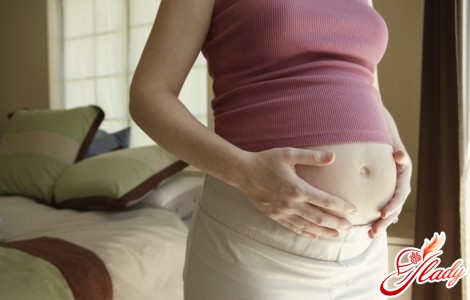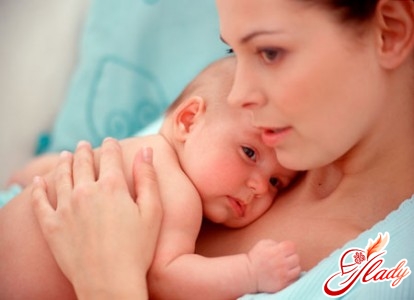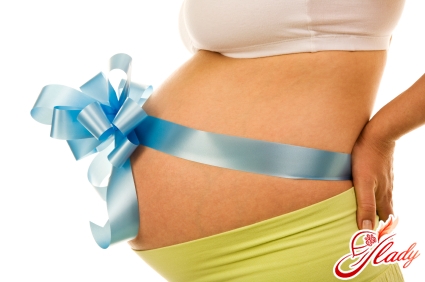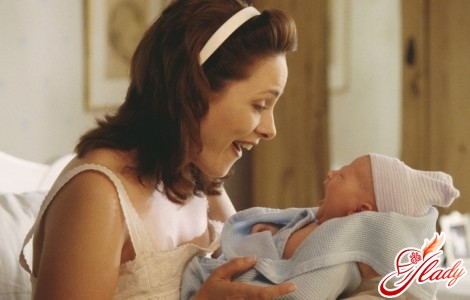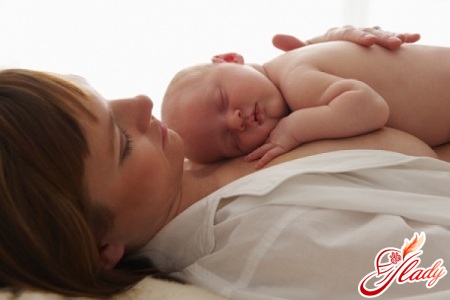 The first weeks after birth are alwaysare not easy. The whole burden of responsibility for the baby lies primarily on the mother. And this, in turn, can cause a woman a state of anxiety, inexplicable irritability, tearfulness and even aggressiveness. Emotional ups and downs are due to changes in hormonal levels, fatigue, lack of experience or understanding with the child, lack of support from relatives. For some women in labor, these fluctuations are insignificant or disappear within a few weeks after the birth of the baby. In other cases, there may be a sense of inability to overcome difficulties and a constant sense of concern. A woman is overtaken by postpartum depression. Many underestimate this disease and its consequences. But in vain. The mental state of a person is sometimes much more important than physical state. Moreover, if the child is growing up in the family, absorbing the mood of the mother, like a sponge. Signs of the development of postpartum depression may be different. Here are the most serious:
The first weeks after birth are alwaysare not easy. The whole burden of responsibility for the baby lies primarily on the mother. And this, in turn, can cause a woman a state of anxiety, inexplicable irritability, tearfulness and even aggressiveness. Emotional ups and downs are due to changes in hormonal levels, fatigue, lack of experience or understanding with the child, lack of support from relatives. For some women in labor, these fluctuations are insignificant or disappear within a few weeks after the birth of the baby. In other cases, there may be a sense of inability to overcome difficulties and a constant sense of concern. A woman is overtaken by postpartum depression. Many underestimate this disease and its consequences. But in vain. The mental state of a person is sometimes much more important than physical state. Moreover, if the child is growing up in the family, absorbing the mood of the mother, like a sponge. Signs of the development of postpartum depression may be different. Here are the most serious:
- "Children's melancholy" - usually manifests itself in the first weeks after childbirth. Most often it is short-lived. This type of postpartum depression is associated with a feeling of a complete change in the world around itself
- Excessive talkableness, anxiety or tearfulness
- Sharp changes in appetite. The usual sign of postpartum depression is loss of appetite
- Insomnia
If even with enough rest (and this is foryoung mother - a huge rarity) you have the above feelings, you need to seek support from a psychologist for postpartum emotions. Many women are ashamed of their inexplicable emotions, hide them. Still would! In fact before us did not learn to save nerves. In our country, it was not accepted to suffer from depression and go to psychotherapists. During the Soviet Union, all women were happy. Head by head. Because it was so ordered. And tears, nervous breakdowns and postnatal depression are all a whim. So the women in labor suffered in silence. And they raised their daughters in ignorance that it's possible to cry. And suffer from depression. And most importantly - to be treated for it. 
Postpartum depression: the crux of the problem
Meanwhile, the emergence of postpartum depressionscientifically proven and fully understandable. With the birth of a baby during the day in the body of a woman there is a sharp hormonal adjustment. The level of protesterone and estrogen falls to normal, previous pregnancy. The adrenal glands and thyroid gland secrete less adrenaline and norepinephrine. Sensitivity to external and internal stimuli grows, fear and depression, apathy and inertia arise. In order that the depression does not drag on, close mothers should help her cope with causeless (seemingly) mood changes. Postpartum depression is not always evident to others, it can be perceived as indifference or whims of an inexperienced mother. At this moment, the support of the child's father is especially valuable, his willingness to share care and anxiety for the child, the desire to fight for the happiness of the family, the ability to understand women's uncertainty and anxiety. In many respects this is a test of the strength of family relations: they can become closer or, conversely, formal and detached. Often for a young mother there are enough words that she is still loved. As for others, they should remember that this mood does not bring pleasure to the woman herself. She suffers much more than others, because the feeling of guilt adds to the psychosis. It is aggravated by the fact that the young mother is not able to fight her problem on her own. Therefore, one should not appeal to her reason and will power, but rather try to understand a loved one and share his anxieties. But back to the women in childbirth. To further aggravate their nervous state may lack of sleep, constant care for the child and tired fatigue. Therefore, the more help the young mother, the better. This is especially important if a woman has a first child. During this period the girl is full of doubts and not completely sure of herself. The most affected by emotional complications in the postpartum period are those women who had suffered from depression before.
Postpartum depression with the eyes of a baby
One of the causes of the crisis may be feelingloss, separation, because during childbirth, the symbiotic unity of mother and child is destroyed, which causes both of them to suffer. For a child, birth is the first stress, he experiences horror from bright light, loud voices, sharp sounds, abdominal pain due to hunger and overcrowded intestines. The stronger the mother's attachment to the baby, the sharper she feels his needs and empathizes with his condition. In addition, after giving birth, a woman does not always have the opportunity of constant communication with her child. It is noticed that women who are separated from their children in the first days after childbirth are more prone to postpartum depression. And if you are in the number of such women in childbirth, do not rush to ask the nannies to give you a child. For you now it is important to find the charm in a new, separate existence with your child. That is, learn to love the baby, but not to belong to him completely. Take care of it, but not make it your own. You have yet to fight for his happiness for the rest of your life. So now just relax and rest.
Maternity is the gift of nature
With the birth of a child, especially the first, you are inyou can fully realize that the carefree period of your life has ended with her habits, personal freedom, some professional plans. You may think that now all your time belongs only to the child, and you do not have any rights to your own life, and that it will now never end. There is irritability, depression, discontent with yourself. This state of the mother is not the best way to affect the child. When an unhappy mother touches the baby with an anxious expression on her face and tears in her voice, the child also becomes nervous. Depression prevents mutual understanding between mother and baby. Suffer a little. Within a few weeks after birth, your child will smile and recognize you, and you will forget all your ambitious plans for life and immerse yourself in the joy of motherhood. In addition, the adoption of motherhood does not necessarily have to occur at the time of the birth of the child. This feeling develops gradually throughout life, imperceptibly present and flashing in special moments. It takes time to realize that now you are a mother. Motherhood is a turning point in a woman's life. It is as natural as the crisis of adolescence. Old ideas about themselves are breaking down and new ones are being built. The transition period of the mother begins with the desire of a woman to have a child, continues during pregnancy and lasts the first year of the child's life. At this time the mother gives birth to responsibility for herself and the child, the notion of femininity and sexuality changes, a deeper appreciation of herself arises. But, experiencing a crisis time, a woman becomes more vulnerable and fragile and therefore requires a more careful attitude from others. Often in the manifestation of a woman's maternal instinct, her baby helps her. It is the child who makes a woman a mother. They develop towards each other. The baby adapts to the awkwardness of the mother, to the peculiarities of her voice, movements, and the woman learns to do everything right, to understand the needs of the child. To have a real love between mother and child, there is not enough breast milk or games. Unique relationships begin with the realization of a woman that she has something from the child, and there is something in her about it. Relying on each other, mom and baby will be happy: he will grow up, feeling loved and protected, and she will develop her love. With the "baby blues" syndrome, any harsh word is enough for a woman to cause tears. But tears are not the only reaction in this case. Some women begin to behave aggressively in moments of weakness. And if you - one of these women in childbirth, then understand that it is not necessary to fight with others, but with postpartum depression. While in the hospital, you can discuss your problems with the midwife. This is even more a correct choice than an appeal to relatives, because your loved ones are sometimes a source of problems, and midwives are well acquainted with the typical concerns of mothers in the postpartum period. Do not hesitate to consult a psychologist, no one will consider you abnormal. If you do not understand what's bothering you, now, then later it will be much more difficult. 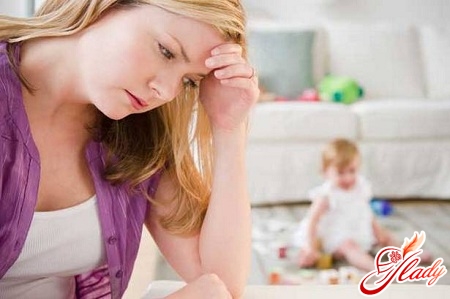
Depletion and Depression
We already wrote that the recovery period afterbirth takes an average of 6-8 weeks. But this time is not enough to completely restore its physical form, working capacity. On the contrary, such an installation can lead to a completely opposite result and permanently disable you, which will not only harm you, but your child. You must remember that your main task is to feed the child. After childbirth in the period from the 4th to the 6th week, the child's appetite rises. Accordingly, the mother increases the production of milk. All this leads to stressful nights without sleep, chronic lack of sleep and fatigue. In addition, some babies cry continuously - day and night, and this can bring the mother to a nervous breakdown. Often, not finding the reasons for such crying, the mother begins to blame for everything herself. Another problem that you may face after the birth of a child is the cooling of your friends and girlfriends to you, if only one of them himself did not have a child. The opposite situation is overly intrusive attention of relatives. At first, it may be necessary to limit the circle of visitors so that they do not fatigue you once again. After all, communication will require quite a lot of your strength and take a lot of time. If after some time after the birth of the child you feel headaches, there will be gastrointestinal disorders, you will be constantly chilly, this is a sign of postnatal exhaustion. Most often it occurs in the second or third month after the birth of the child. If all this is added to the emotional experience, the uncertainty that you are a good mother, you can easily fall into a state of postpartum depression. The causes of depression are often found in overexertion, in that all cares about the house and the child fall on the shoulders of the woman. Therefore, in no case do not neglect the help of a husband, grandmothers, grandfathers, girlfriends. Your loved ones and especially the child need not a heroine, but a healthy mother. A sufficient sleep is the main factor ensuring normal breastfeeding. Try to set certain hours for rest, for example in the afternoon. Even if you do not want to sleep, just relax, close your eyes and do not communicate with anyone at this time. This will allow your body to regain strength.
Postpartum psychosis
This is the most severe form of postpartum depression. With postpartum psychosis, women lose contact with reality, lose the ability to spatial orientation. They hear inner voices, feel the urge to struggle with the world around them. The emergence of postpartum psychosis is indicated by the appearance of insomnia, fear, clouding of consciousness, hallucinations, persecution mania, alcohol or drug dependence. There may be a desire to do something with yourself or with the child. Causes of psychosis: intensive hormonal restructuring after childbirth, emotional experiences, hereditary predisposition to mental disorders, problems in family relationships. Postpartum psychosis is a consequence of physical, hormonal and mental overload. Such a depression requires psychiatric help. Most postpartum psychoses occur from the 7th to the 21st day after birth. And do not forget that the earlier the treatment is started, the greater the chance of a speedy recovery. Finally, I would like to wish all women to be attentive not only to their family, but also to their own health. Believe that your children need you healthy and fun. Therefore, if you feel that postpartum depression has covered you with your head, do not delay treatment. We advise you to read:





